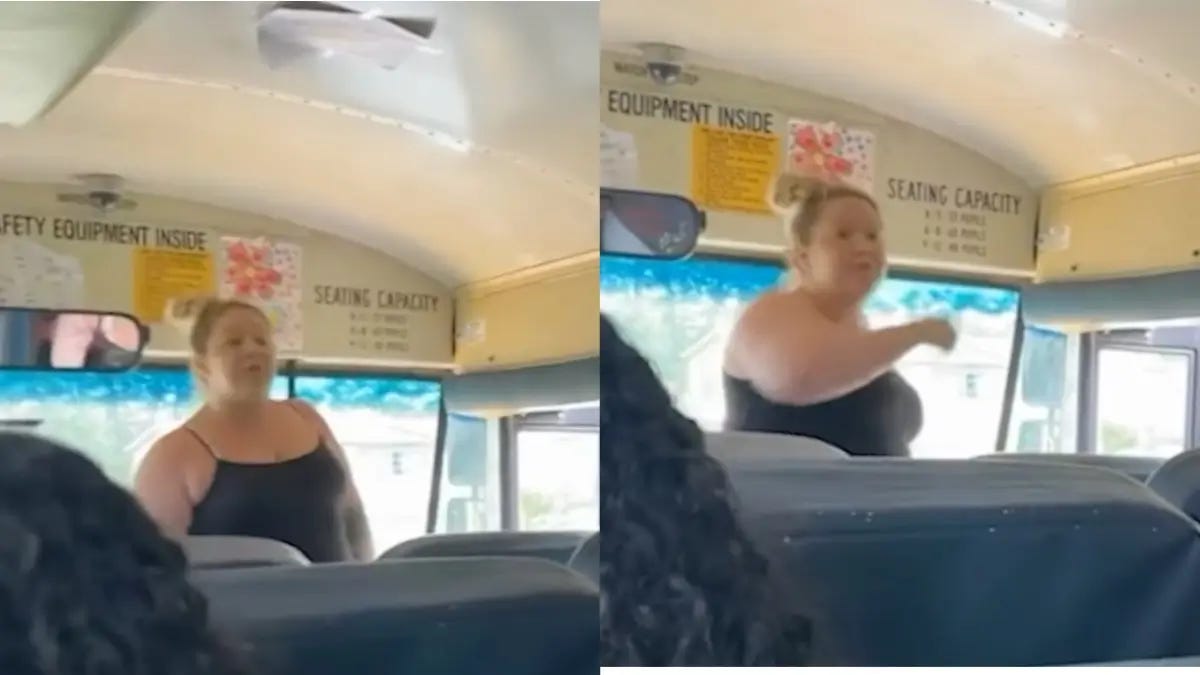When “Protecting Your Kid” Turns Violent and Racist
“I’d Do It Again”: Why a White Mom’s Racist School Bus Rant Is Bigger Than One Outburst
Family, we need to talk.
On May 15, a 35-year-old white mother in North Carolina, Samantha Spoor, boarded a school bus full of middle schoolers, unleashed a profanity-laced tirade, and—most chilling of all—called a Black student the N-word on video. She’s since been arrested and charged, but here’s what she told the media:
“I wouldn’t use the same language. But I’d do it all over again to protect my kid.”
Let that sink in.
Spoor claimed her behavior wasn’t about race—just about protecting her child from bullies. But her words, captured on a now-viral video, tell a different story. Threats. Curses. A racial slur so vile it stings every time we hear it. And somehow, she still doesn’t think it was racially motivated?
This isn’t just a case of one woman losing control. This is about a system that lets whiteness weaponize “concern for safety” while Black children bear the brunt of the harm.
This Ain’t New: A Legacy of Racial Double Standards in Schools
Black students have long faced higher rates of discipline, harsher consequences, and more surveillance than their white peers. And incidents like this reveal how quickly Black children are dehumanized—even by adults outside their schools.
Imagine the trauma of being a Black child on that bus, targeted by a stranger, called out your name, and having no one step in—not even the bus driver. The driver did file a police statement later, but during the incident? Silence.
We know that silence isn’t neutral. It’s complicity.
Spoor’s case is especially painful because she’s not new to this. According to the bus driver’s account, she’s done this before. This wasn’t a one-time lapse in judgment. This is a pattern.
Why “Intent” Doesn’t Matter
Let’s be clear: You don’t have to intend to be racist for your actions to do harm. Spoor’s claim that it wasn’t “racially motivated” rings hollow when she chose to use a slur that has been used to terrorize Black people for centuries.
Black folks know that “I’m not racist” has become the go-to shield for people who want to avoid accountability while still doing racist things.
Intent doesn’t erase the impact.
Where Do We Go From Here?
Currituck County Schools says they’re reviewing their safety protocols. But this moment calls for more than just a policy tweak. It demands a deeper reckoning with how racism plays out in school systems—and in the very adults entrusted to protect children.
Here’s what needs to happen next:
Anti-racism and trauma-informed training for all school staff, including bus drivers.
A zero-tolerance policy for verbal abuse and hate speech on school grounds and transportation.
Counseling and support for the children affected—especially those who were directly targeted.
A community-wide conversation about accountability and protection that doesn’t come at the cost of Black children’s safety.
A Final Word
To the young girl who was called the N-word and kept her composure: We see you. You deserved protection and peace, not pain. To her mother: Thank you for speaking up. This fight is far from over.
And to the rest of us: Let’s not let this moment pass without action. Talk to your kids. Check your school board. Hold systems accountable.
We’ve seen what silence does. Let’s make some noise.
Stay Loud. Stay Vigilant. Stay Rooted.
If this story moved you, share it. Talk about it. And let’s keep building a world where Black children are not only protected but deeply valued.








